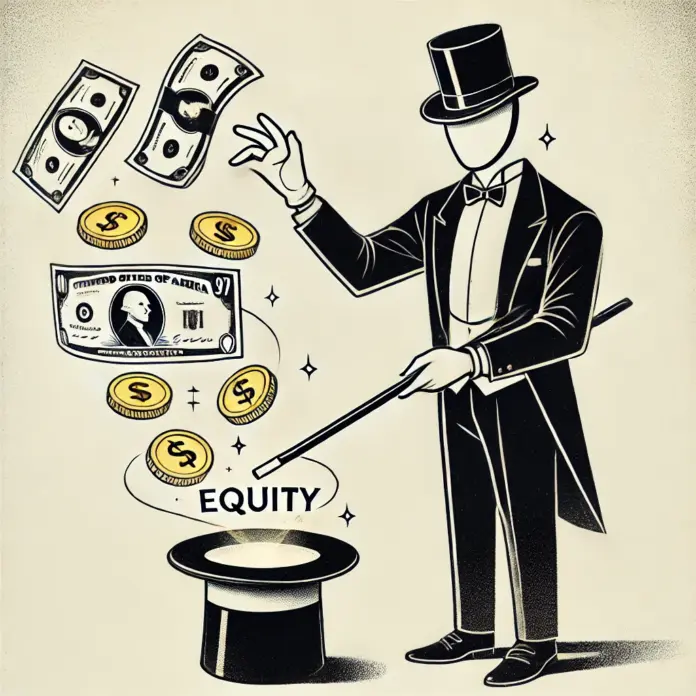You’re sitting on a goldmine of equity—in your home, business, or investments—but most advisors only pitch tired plays like home equity loans or reverse mortgages, riddled with fees and risks. Those are amateur moves. The wealthy tap hidden equity strategies, unlocking cash without selling assets, racking up debt, or triggering taxes. These aren’t flashy; they’re surgical, sitting in plain sight if you know where to look. Think real estate syndications, sale-leasebacks, or private equity maneuvers that turn locked-up value into liquid wealth. This isn’t about gambling your nest egg—it’s about making your equity work like a machine to fuel your empire. Here’s the equity play no advisor talks about, and how you can pull it off.
Home equity loans? They’re debt traps with 6–9% interest, risking your house if payments stall. Reverse mortgages? They’re worse, eating your home’s value with fees while you’re still living in it. The elite don’t touch these—they use hidden equity strategies to unlock value without losing control. One powerful play: real estate syndications. Instead of cashing out your home’s $200,000 equity with a risky loan, invest $50,000 in a syndicated apartment complex. These pool investor funds to buy big properties, delivering 8–12% annual returns and tax breaks like depreciation. One client put $75,000 into a syndication, netting $6,000 yearly passive income, plus $20,000 in appreciation over three years, without monthly loan payments. Your equity’s working, not bleeding.
Another overlooked gem: the sale-leaseback. Own a commercial property or business real estate? Sell it to an investor, pocket the equity—say, $500,000—then lease it back to keep running your operation. You’ve freed up cash to reinvest in rentals, stocks, or a new venture, all while deducting lease payments as a business expense. A restaurateur I know sold his $1 million storefront, leased it back, and used the cash to open two new locations, tripling his revenue. No debt, no liens, just liquid capital. Sale-leasebacks aren’t just for businesses—homeowners can explore similar deals with family trusts, selling to a trust they control and leasing back, though it needs a sharp lawyer to dodge tax traps. This is equity unlocked, not borrowed.
Private equity plays are another elite move. Got a business worth $2 million? Instead of selling outright or borrowing against it, sell a minority stake—say, 20%—to a private investor for $400,000. You keep control, use the cash to scale, and share profits later. A tech founder sold a 15% stake in her startup, got $300,000 to expand, and doubled her company’s value in two years. Her equity’s still growing, and she didn’t take on debt. Or consider private lending: use your business equity as collateral to secure a low-interest loan, then lend it out at 10% to a real estate developer. You pocket the spread—say, 5% on $100,000, or $5,000 yearly—while your asset stays intact. These are hidden equity strategies the wealthy whisper about at country clubs, not on CNBC.
Taxes make these plays shine. Home equity loans offer no tax breaks unless the funds are used for home improvements. Syndications, though, deliver depreciation deductions that offset income, sometimes zeroing out your tax bill on profits. Sale-leasebacks let businesses deduct lease payments, slashing taxable income. Private equity deals can defer capital gains if structured through LLCs or trusts. One client’s syndication investment cut his tax bill by $10,000 yearly via depreciation, while his $50,000 stake grew to $70,000. Pair these with an indexed universal life (IUL) policy—borrow tax-free against your equity-funded IUL to double down on investments, and pass a tax-free death benefit. A guy I know funded an IUL with $25,000 from a sale-leaseback, borrowed $50,000 tax-free for a rental, and kept his cash compounding. That’s equity working overtime.
But hidden equity strategies aren’t plug-and-play. Syndications can lock up funds for years; sale-leasebacks need ironclad leases; private deals carry partner risks. You need a team—CPA, lawyer, financial strategist—to vet deals and dodge pitfalls. Research markets, check track records, and ensure cash flow covers any commitments. One client dodged a bad syndication by spotting weak management; his next deal netted 10% annually. The wealthy don’t guess—they analyze. The payoff? Equity that’s liquid, growing, and tax-smart, not trapped in a house or business waiting for a sale. A woman used a $100,000 sale-leaseback to fund a syndication, now earning $9,000 yearly passive while her original asset appreciates.
The mindset shift is key. Stop seeing equity as a piggy bank to crack open with loans. See it as a lever to pull for wealth. Start small: got $20,000 in home equity? Explore a syndication with a 7% return instead of a HELOC. Or list your business’s value and pitch a minority stake to an investor. Read about sale-leasebacks or talk to a CPA about tax-advantaged equity plays. There’s a free wealth leverage checkup out there—grab it, run your numbers, and see where your equity’s sleeping. The rich don’t wait for advisors to spoon-feed them these plays; they hunt them. You can too. Stop settling for loans or mortgages. Pull the hidden equity strategies out of the hat, and let your wealth multiply like magic.

Louie Molina is the host and architect of The Empresario. Drawing from years of financial design and strategic consulting, he created The Empresario Reserve as the ultimate repositioning strategy — a system that turns financial instruments into instruments of control.
